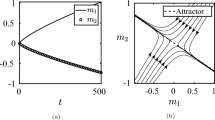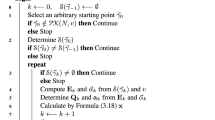Abstract
This paper investigates absorption and global accessibility under perfect foresight dynamics in games with linear incentives. An action distribution in the society is absorbing if there is no equilibrium path escaping from the distribution, and globally accessible if, from every initial distribution, there exists an equilibrium path which converges to the distribution. Using time symmetry of the dynamics, we show that every absorbing strict Nash equilibrium, if it exists, is globally accessible under zero rate of time preference. With the additional assumption of supermodularity, we prove that there generically exists an absorbing strict Nash equilibrium. Relations with a global game and a reaction-diffusion model also become clear.
Similar content being viewed by others
References
Basu K, Weibull JW (1991) Strategy subsets closed under rational behavior. Econ Lett 36:141–146
Carlsson H (1989) Global games and the risk dominance criterion. Mimeo
Carlsson H, van Damme E (1993) Global games and equilibrium selection. Econometrica 61:989–1018
Dávila J (2001) Time and uncertainty in overlapping generations economies. J Econ Theory 100:356–386
Fife PC (1979) Mathematical aspects of reacting and diffusing systems. Spriner, Berlin, lecture notes in biomathematics 28
Frankel DM, Morris S, Pauzner A (2003) Equilibrium selection in global games with strategic complementarities. J Econ Theory 108:1–44
Gilboa I, Matsui A (1991) Social stability and equilibrium. Econometrica 59:859–867
Hofbauer J (1999) The spatially dominant equilibrium of a game. Ann Oper Res 89:233–251
Hofbauer J, Sorger G (1999) Perfect foresight and equilibrium selection in symmetric potential games. J Econ Theory 85:1–23
Hofbauer J, Sorger G (2002) A differential game approach to evolutionary equilibrium selection. Int Game Theory Rev 4:17–31
Kim Y (1996) Equilibrium selection in n-person coordination games. Games Econ Behav 15:203–227
Kojima F (2006) Risk-dominance and perfect foresight dynamics in N-player games. J Econ Theory 128:255–273
Kojima F, Takahashi S (2006) p-dominance and perfect foresight dynamic. J Econ Behav Organ (in press)
Matsui A, Matsuyama K (1995) An approach to equilibrium selection. J Econ Theory 65:415–434
Matsui A, Oyama D (2006) Rationalizable foresight dynamics. Games Econ Behav 56:299–322
Matsuyama K (1991) Increasing returns, industrialization, and indeterminacy of equilibrium. Q J Econ 106:617–650
Morris S (1997) Interaction games: a unified analysis of incomplete information, local interaction and random matching. Mimeo
Morris S (2000) Contagion. Rev Econ Stud 67:57–78
Morris S, Shin HS (2003) Global games: theory and applications. In: Dewatripont M, Hansen LP, Turnovsky SJ (eds). Advances in economics and econometrics: theory and applications, Eighth World Congress, vol 1. Cambridge University Press, Cambridge
Morris S, Ui T (2005) Generalized potentials and robust sets of equilibria. J Econ Theory 124:45–78
Oyama D (2002) p-dominance and equilibrium selection under perfect foresight dynamics. J Econ Theory 107:288–310
Oyama D, Takahashi S, Hofbauer J (2003) Monotone methods for equilibrium selection under perfect foresight dynamics. Mimeo
Selten R (1995) An axiomatic theory of a risk dominance measure for bipolar games with linear incentives. Games Econ Behav 8:213–263
Tercieux O (2006) p-best response set. J Econ Theory 131:45–70
Author information
Authors and Affiliations
Corresponding author
Additional information
The definition of absorption used in this paper is slightly different from the original one in Matsui and Matsuyama (1995). This difference is neglected in Sect. 1, and will be discussed in Sect. 2.2.
Rights and permissions
About this article
Cite this article
Takahashi, S. Perfect foresight dynamics in games with linear incentives and time symmetry. Int J Game Theory 37, 15–38 (2008). https://doi.org/10.1007/s00182-007-0101-6
Accepted:
Published:
Issue Date:
DOI: https://doi.org/10.1007/s00182-007-0101-6




